|
TRANSLATE THIS ARTICLE
Integral World: Exploring Theories of Everything
An independent forum for a critical discussion of the integral philosophy of Ken Wilber
 David Christopher Lane, Ph.D.
Professor of Philosophy, Mt. San Antonio College Lecturer in Religious Studies, California State University, Long Beach Author of Exposing Cults: When the Skeptical Mind Confronts the Mystical (New York and London: Garland Publishers, 1994) and The Radhasoami Tradition: A Critical History of Guru Succession (New York and London: Garland Publishers, 1992). David Christopher Lane, Ph.D.
Professor of Philosophy, Mt. San Antonio College Lecturer in Religious Studies, California State University, Long Beach Author of Exposing Cults: When the Skeptical Mind Confronts the Mystical (New York and London: Garland Publishers, 1994) and The Radhasoami Tradition: A Critical History of Guru Succession (New York and London: Garland Publishers, 1992).
THE AGNOSTICS
Thinkers in an Indeterminate Cosmos
Introduction |
Isaiah Berlin |
Charles Darwin |
John Dewey |
Enrico Fermi |
David Hume |
Edmund Husserl |
Thomas Henry Huxley |
Thomas Kuhn |
Lynn Margulis |
John Maynard Keynes |
G.E. Moore |
Karl Popper |
Michael Schmidt-Salomon |
Herbert Spencer |
Leo Szilard
G.E. MOOREFelisha JacobusBorn on November 4, 1873 in London, England, George Edward Moore was an influential and important British philosopher of the first half of the Twentieth century. Moore's systematic approach towards ethical problems and outstandingly detailed perspective in regards to philosophy made him an exceptional British thinker. Moore along with two other philosophers, Bertrand Russell and Ludwig Wittgenstein, were the triune philosophers at the Trinity College, Cambridge as the founders of the analytical approach and tradition in philosophy. He is also well known for breaking away from the popular “absolute idealism” and was an advocate and defender of the “common sense” approach to philosophy as well as intuitionism in ethics. 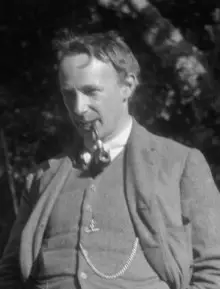 George Edward Moore G.E. Moore grew up in South London where him and his siblings were taught at a very young age to read, write, study music, and speak French. At the age of eight, Moore attended school at Dulwich College where he studied the classics in Greek and Latin. In 1892, at the age of eighteen, Moore attended Trinity College, Cambridge to further study classics, but became intrigued by the study of philosophy. He then met fellow student Bertrand Russell where the two became lifelong friends, together forming a philosophical alliance. After graduating in 1896, Moore was elected to a fellowship at Trinity College, and after, a lectureship in 1911. In 1921, he became the editor of the Mind, the leading British philosophical journal, and a Professor at Cambridge in 1925. Together with Russell and Wittgenstein, Cambridge became one of the most prominent centres of philosophy in the world, marking the golden age of Cambridge philosophy. Best known today for his influential work in the defense of ethical non-naturalism in the field of ethics and the “common sense” approach, Moore started off with the belief in British idealism under the influence of F.H. Bradley and John McTaggart. Moore even submitted a dissertation on 'The Metaphysical Basis of Ethics' where he acknowledges Bradley's belief system and presents an idealist ethical theory. This was assumed to be the precursor of his famous claim of the “naturalistic fallacy”, which is the assumption that if something is natural, it must be considered 'good'. Although in the end, Moore came to reject the idea of idealism, Moore's early idealist enthusiasm seems to have a great impact on his future, more concrete thoughts. One of Moore's many achievements is his book titled Principia Ethica, published in 1903. The first three chapters of the book are mostly composed of his 1898 series of lectures on 'The Elements of Ethics', whereas the last three chapters were mostly new material. The book also contains the famous claim mentioned earlier, called the “naturalistic fallacy”, which is considered the core of the book. Moore's arguments are related to the Scottish philosopher, David Hume. Hume mentioned the “is/ought” fallacy, a fallacy that asserts situations when statements of facts (is) jump to statements of value (ought) without any plausible reason. In the case of nature, jumping from 'is' to 'ought' will raise the question whether something that is done of unnatural means is 'ought' to be considered bad, because it 'is' against nature. Moore claimed that arguments that involve naturalistic terms such as 'pleasant', 'satisfying' or 'healthy' to make ethical claims were unsound. The 'naturalistic fallacy' argues that not all things that are unnatural are unethical. Humans act against nature all the time; for example, vaccinations, medicine, electricity and so forth. This does not mean that those things that humans do are unethical. He insists that goodness is indefinable and unanalyzable, and that ethics is actually an autonomous science, irreducible to nature. Claims that involve such naturalistic terms are not considered as claims that are true by definition, because its truth remains as an 'open question', meaning that people can doubt such claims because it is simply objective, which would have been impossible if it were truly a fact. His most famous criticisms of idealism are also contained in his paper 'The Refutation of Idealism' in 1903. Moore argues that arguments of the Idealist thesis that reality is spiritual are based on claims that are flawed. That being said, Moore is not refuting the Idealist thesis, but rather the argument that it implies. Even by proving his point of the flawed arguments, he claimed to not have proved anything about the Universe in general. Moore says: “I shall only attempt to arrive at the truth about a matter, which is in itself quite trivial and insignificant, and from which, so far as I can see and certainly so far as I shall say, no conclusions can be drawn about any of the subjects about which we most want to know.” Moore admitted that he himself cannot argue about the truth whether reality is indeed spiritual or not. Even so, Moore did refute the idea of Idealism that 'the object of experience is inconceivable apart from the subject' and that it is important to clearly make a distinction between the mind and its objects that are encountered in connection with meaning. He makes an example of the color 'yellow' that is clearly apart from the 'sensation of yellow', and that because it is so identical, it is sometimes difficult to distinguish the two. Aside from ruling out idealism, Moore also denied the approach of skepticism, specifically metaphysical skepticism, a type of skepticism claiming that the beliefs that are in question are false. Such skeptics might argue that those beliefs are internally incoherent and contradictory. These kinds of skeptics might also present independent arguments that contradict the claims of such beliefs. The external world is defined as the world that contains all the objects and events whose existence is accepted by the human mind, but which exists independently of the mind. Moore argued that for an agent to know if something is true, the agent must have evidence that rules out the possibility that it is false. Following that statement, Moore stated that the only evidence about the external world is sensory evidence about how things appear; although, there is no existing external thing presented in this case, such things are still possible. Therefore, he concluded that there is no evidence that rules out the possibility that external things do not exist. Moore asserted three criteria for a good argument: the premises must be different from the conclusion, the conclusion must follow the premises, and the premises must be known to be true. Moore concluded in his overall argument that we cannot insist that knowledge is 100% certainty, and that certainty in itself is too strict. If people were to demand absolute certainty for knowledge, then we would know very little about it. In conclusion to the overall idea of Moore's arguments in respect to philosophy, one must admit that one does not know anything, and therefore, cannot prove that something does or does not exist without any cogent or strong evidence proving otherwise. Moore's inspiring legacy is primarily a collection of arguments, puzzles, and challenging thoughts and perspective. His final conclusions and statements might not be the most satisfying, but Moore was known for his unique and intellectual approaches towards problems, changing the course and touch in the world of British philosophy. The brilliant philosopher decided to remain in Trinity College Cambridge and teach there for the rest of his career life. Moore died in Cambridge in 1958 and was remembered by friends and colleagues as a man of great character. Further Reading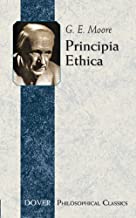 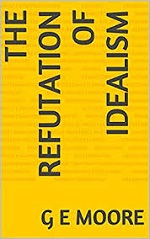 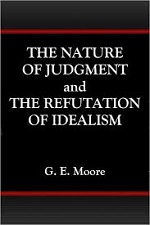
FROM THE INTRODUCTION | DAVID LANE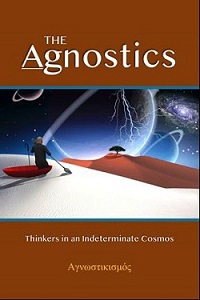
Often in the philosophy classes I have taught in undergraduate and graduate school, I would bring up this point of “unknowingness.” Pointing to a crumpled piece of writing paper, I would ask the class, “What is this?” Almost in unison, the students would respond, "A piece of paper." Taking this as my cue to lead into a deeper philosophical investigation of materialism, I probed further, "Yes, but what is that?” Catching my drift, one student invariably answered, “Oh, it is actually a transformed sheet of wood.” Not wanting them to stop there, I asked, “And wood is made of what?” “It's comprised of molecules," the more scientifically oriented students would shout. Connecting to the now forgotten inner space ride at Disneyland, which takes one through an imaginary voyage inside a snowflake molecule, I queried, “But what is a molecule made of.” By this time, we had gotten down to the subatomic level, and our words began to betray our modicum of knowledge (electrons, protons, quarks, lucky charms, superstring). The final question I asked was quite simple, but given the line of investigation it led to some severe complications: What is matter? Well, it should be obvious to the reader as it was to my class and to myself that there's only one truly appropriate response, “I don't know.” Now, this is exactly the response not only of most mystics, but most quantum physicists as well. As Sir Arthur Eddington, the distinguished astronomer put it, “Something unknown is doing we don't know what!” To be sure, mystics have said that the world (or matter) is nothing but consciousness. But, what is consciousness? Not even a sage as enlightened as Ramana Maharshi of South India could answer that question. To such queries, Ramana would often sit in silence. Ultimately, matter leads to consciousness and consciousness to God or Nature (with a capital N) and both to Mystery. However, no matter how you define it, slice it, categorize it, blend it, intuit it, the fact remains that Reality is a Mystery, and nobody apparently (not me, not you, not Einstein) knows what that Reality is. We are sitting right in the middle of the Mystical Dimension.
Comment Form is loading comments...
|